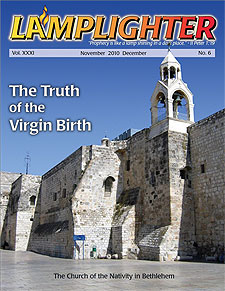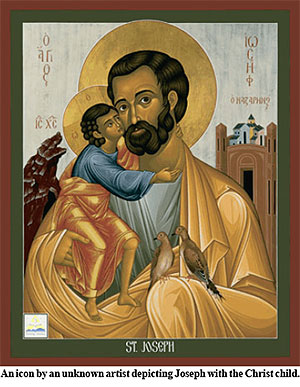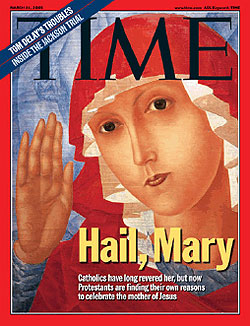The Truth of the Virgin Birth
Is it Essential to the Christian Faith?

I’d like to begin by asserting my thesis right up front: Belief in the virgin birth of Jesus is absolutely essential to the Christian faith. To deny the virgin birth is to deny the deity of Jesus, and if Jesus was not God in the flesh, then you and I have no hope whatsoever.
A Doctrine Under Attack
And yet, despite the centrality and essentiality of the doctrine of the virgin birth, there is no doctrine in all of Christendom that has been more reviled and ridiculed.
Consider Thomas Jefferson. He was a Deist who rejected the supernatural. He produced his own version of the New Testament. It was a cut and paste job that deleted the virgin birth, all the miracles of Jesus, and, of course, His resurrection. Concerning the virgin birth, Jefferson wrote:
The day will come when the mystical generation [conception] of Jesus by the Supreme Being as his father, in the womb of a virgin, will be classed with the fable of the generation of Minerva in the brain of Jupiter.1
In the early 20th Century, when the German School of Higher Criticism invaded this country, the leading popular spokesman of that liberal viewpoint was Harry Emerson Fosdick, the pastor of Riverside Church in New York City. Here is his condescending observation concerning the virgin birth: “Of course I do not believe in the virgin birth… I do not know any intelligent minister who does.”2
In his book, In Quest of Jesus, published in 1983, W. Barnes Tatum, a professor at Greensboro College in North Carolina, called the virgin birth “theological fiction.”3
Hans Kung, the renowned Catholic theologian who has been censured by his church for his heretical ideas, had this to say about the virgin birth: “Although the virgin birth cannot be understood as a historical-biological event, it can be regarded as a meaningful symbol, at least for that time.”4
Theologian Robert Funk, the founder and leader of the notorious Jesus Seminar, wrote these words about the virgin birth:
The virgin birth of Jesus is an insult to modern intelligence and should be abandoned. In addition, it is a pernicious doctrine that denigrates women.5
And then, of course, there is John Shelby Spong, the former Episcopal Bishop of Newark, New Jersey, who is renowned for his apostate views. Here’s what he had to say about the virgin birth:
In time, the virgin birth account will join Adam and Eve… as clearly recognized mythological elements in our faith tradition whose purpose was not to describe a literal event but to capture the transcendent dimensions of God in the earthbound words and concepts of first-century human beings.6
In other words, the virgin birth, like the story of Adam and Eve, is just a myth dreamed up by primitive and ignorant people.
The Significance of These Attacks
Now, the amazing thing about all these examples is the fact that every one of the persons I have quoted was a professing Christian! So, I’m not talking about attacks by atheists or agnostics. Their attacks are expected. I am talking about attacks by professing Christians.
And lest you think this kind of unbelief is characteristic only of the most liberal Christians, let’s take a look at Rob Bell. He is the pastor of a megachurch called Mars Hill Church that is located in Grand Rapids, Michigan. And he is one of the leaders of what is called The Emergent Church Movement, a movement that claims to be Evangelical, but in reality, is apostate.
In his best-selling book, Velvet Elvis, subtitled Repainting the Christian Faith, Rob wrote these words about the virgin birth:
If you found out Jesus had an earthly father named Larry, they find Larry’s tomb, do DNA samples and prove beyond a shadow of a doubt that the virgin birth was really just a bit of mythologizing… Could you still be a Christian?7
Notice how subtle he is with this statement. Without denying the virgin birth, he just proceeds to cast all sorts of doubt about it, and in the process he makes it clear that if it is a myth, it would not jeopardize his faith because he obviously does not consider it to be essential to Christianity.
Amazing Births
So, what about it? Is the virgin birth just a bit of mythology? Does it really make any difference to the Christian faith?
The Bible tells us about many remarkable births. For example, there is the birth of Isaac to parents nearly 100 years old. And then there are the births of Samson, Samuel, and John the Baptist — all of whom were born to women with barren wombs.
In like manner, there have been some remarkable births since Bible times — like the Dionne Quintuplets in Canada in 1934, the first such birth in which all five survived to infancy. In 1974 in South Africa, the Rosenkowitz family gave birth to sextuplets, again the first such birth in which all six survived. And then there were the McCaughey Septuplets born in Iowa in 1997. Only to be outdone by the Suleman Octuplets born in California in 2009.
But none of these births, as spectacular as they may have been — none of them is the most spectacular birth of modern times. The most amazing birth since biblical times would have to be that of Louise Brown in Lancashire, England on July 25, 1978. She was the first baby conceived outside the human body — the first “test tube baby.”

History attests to barren wombs made fertile. History attests to amazing multiple births. History attests to conception outside the womb.
But none of these births is as amazing, as miraculous, as stupendous as the birth of Jesus of Nazareth — the birth proclaimed to the shepherds of Bethlehem by the angels of God. The birth of Jesus of Nazareth is the most unique birth in all recorded history, for the Bible tells us that He was born of a virgin.
And that’s where I would like for us to go right now — to the Bible. Let’s begin our study of the virgin birth of Jesus by examining the Scriptures.
The Virgin Birth of Jesus
To set the stage for our study, let’s consider a passage from Matthew 1, verses 18-21.
I am going to present these verses from a version of the Bible you may not be familiar with. It is called the Jewish New Testament. It is a translation by David Stern, a Messianic Jew who lives in Jerusalem.8
The purpose of this translation is to show that the New Testament is a book that was written by Jews and is steeped in Jewish culture. He does this by restoring the Jewish names of people and places that have been anglicized in our English translations. Consider carefully this very familiar passage:
18 Here is how the birth of Yeshua the Messiah took place. When His mother Miryam was engaged to Yosef, before they were married, she was found to be pregnant from the Ruach HaKodesh [the Holy Spirit]. 19 Her husband-to-be, Yosef, was a man who did what was right; so he made plans to break the engagement quietly, rather than put her to public shame. 20 But while he was thinking about this, an angel of Adonai appeared to him in a dream and said, “Yosef, son of David, do not be afraid to take Miryam home with you as your wife; for what has been conceived in her is from the Ruach HaKodesh. 21 She will give birth to a son, and you are to name Him Yeshua [which means, ‘Adonai saves,’] because He will save His people from their sins.” 22 All this happened in order to fulfill what Adonai had said through the prophet, 23 “The virgin will conceive and bear a son, and they will call Him Immanuel.” [meaning, “God is with us.”]
The Satanic Attack
As you can see, the Bible clearly states that Jesus was born of a virgin. And I don’t think it would be an overstatement to say that Satan hates the fact of the virgin birth. He hates it because it attests to the divinity of Jesus, and Satan is determined to do everything possible to convince the world that Jesus was just a man.
As an example, consider one of the featured songs contained in the popular Broadway musical and movie called, “Jesus Christ, Superstar.” In one of the key scenes in the production, Mary Magdalene sings a song about Jesus while he is sleeping. The words go like this (emphasis added):9
I don’t know how to love him.
What to do, how to move him.
I’ve been changed, yes really changed.
In these past few days, when I’ve seen myself,
I seem like someone else.
I don’t know how to take this.
I don’t see why he moves me.
He’s a man. He’s just a man.
And I’ve had so many men before,
In very many ways,
He’s just one more.
Notice the words, “He’s a man, he’s just a man.” Satan has orchestrated attacks like this on the fact of the virgin birth ever since it was proclaimed to the shepherds in Bethlehem.
Philosophers and scientists scoff at it as nothing but a “childish myth.” Jewish leaders, from the earliest of times, have written it off as “a cruel hoax.” Saddest of all, many modern day Christian theologians contend that it is “a non-essential legend.”
Satan’s attacks have been very successful.
Today, the virgin birth is flagrantly denied by professors at many Christian seminaries. In fact, I would venture to say that it is the most ridiculed doctrine in the Christian faith. It is usually dismissed as nothing but a “johnny-come-lately myth” conjured up by a bunch of ignorant shepherds in the First Century.
This observation is supported by polls. In 1998 the Harris group took a poll of over 7,000 clergy in the U.S. and found the following percentages of clergymen denying the virgin birth:10
19% of American Lutheran clergy
34% of American Baptist pastors
44% of Episcopalian priests
49% of Presbyterian ministers
60% of Methodist clergy
79% of Congregational pastors
This unbelief among clergy is taking its toll on the American general public. In 1998, the year the clergy poll was taken, 83% of Americans believed in the virgin birth. Ten years later, that percentage had dropped over 20 points to 61%.11
Still, these polls show that among the general public there is much more faith in God’s Word than among the clergy!
Ambivalence in Jesus’ Time
The interesting thing is that this ambivalence about the origin of Jesus is nothing new. Even in the time of Jesus, His origin was a matter of ambivalence and constant speculation.
In John 6 we are told that the Jewish leaders scoffed at His claim that He had come from Heaven. They said, “How can you claim that you came from Heaven when we know your mother and father?”
In John 7 we are told that some of the residents of Jerusalem rejected Jesus’ claim to be the Messiah because they said, “We know where you came from, but whenever the Messiah comes, no one will know where he came from.”
And in John 8 we are told that some of the people accused Jesus of being born of fornication while others claimed he was a half-breed Samaritan.
Another interesting thing is that Jesus Himself revealed the reason for all this ambivalence about His origin. Here’s what He had to say about it in Matthew 16:13-17 —
13 Now when Jesus came into the district of Caesarea Philippi, He began asking His disciples, saying, “Who do people say that the Son of Man is?” 14 And they said, “Some say John the Baptist; and others, Elijah; but still others, Jeremiah, or one of the prophets.” 15 He said to them, “But who do you say that I am?” 16 And Simon Peter answered and said, “You are the Christ, the Son of the living God.” 17 And Jesus answered and said to him, “Blessed are you Simon Barjona, because flesh and blood did not reveal this to you, but My Father who is in heaven.”
Note carefully that last verse. Jesus said His divinity had been revealed to Peter by God the Father. The point is that the only way that anyone will ever know the deity of Jesus is by a divine revelation from God. Man will never come to this knowledge through philosophy, theology, or science. It must be revealed.
Man through his own knowledge will always conclude that Jesus was a great scholar, inspired teacher, visionary prophet, moral leader — or whatever.
But Man, reasoning on his own, will always miss the central fact that Jesus is the Son of the Living God. And therefore, man operating in the flesh will always deny the virgin birth because the virgin birth and the deity of Jesus are inseparable.
If Jesus is God, then He must be born of God. He cannot be born of human parents. It is therefore my position that to deny the virgin birth is to deny the deity of Jesus.
For you see, without the virgin birth, Jesus is — in the words of the Broadway musical — “just another man,” born with the flawed sin nature inherited by all of us from Adam. And if Jesus is just another man, then you and I have no hope whatsoever. That’s why the virgin birth is not a peripheral issue. It is central to the Christian faith.
The Essentiality of the Virgin Birth
Let’s focus for a moment on the essentiality of the virgin birth. Why is it so important to the Christian faith? I would argue that there are three reasons.
First, it relates to the integrity of the Bible as God’s Word. The Bible says point-blank that Jesus was born of a virgin. If that is not true, then what can we believe in the Bible? If what it says about the birth of Jesus is fiction, then how can we believe what it says about His death and resurrection?
Second, it relates to the integrity of Jesus as Messiah. In order for Jesus to be our Savior, three conditions had to be met:
a) He had to be Human. No angel could die for our sins.
b) He had to be Divine. A mere mortal could not bear the infinite price that had to be paid for our sins.
c) He had to be Sinless. A sinner could not die for the sins of others.
The virgin birth guaranteed the fulfillment of all three of these conditions:
a) Because He was born of Mary, He was Human.
b) Because He was conceived by the Holy Spirit, He was Divine.
c) Because He was born holy, without a sin nature, He was qualified to serve as our Savior.
This last point is extremely important. You see, even though both Adam and Eve sinned, God placed the responsibility on Adam (Gen 3:17-19). Romans 5:12-21 emphasizes this point. It states that just as death entered the world through the sin of one man, Adam, and resulted in condemnation for all men, so also, the hope of life and justification have come through one man, Jesus Christ.
The point is that the sin nature is transmitted by the father, and therefore, for Jesus to be born without a sin nature, He had to be born without an earthly father. And this brings us to another important point. It was not the birth of Jesus that was miraculous. He was in the womb of Mary for 9 months and was born just like you and me. What was miraculous was His conception. In a great miracle of creation, He was placed in the womb of Mary by the Holy Spirit.
Dr. Henry Morris, founder of the Institute for Creation Research, describes the process in these words:
The body growing in Mary’s womb must have been specially created in full perfection, and placed there by the Holy Spirit, in order for it to be free of inherent sin damage.
Christ would still be “made of the seed of David according to the flesh” (Romans 1:3), because His body was nurtured and born of Mary, who was herself of the seed of David. He would still be the Son of Man, sharing all universal human experience from conception to death, except sin. He is truly “the seed of the woman” (Genesis 3:15), His body formed neither of the seed of the man nor the egg of the woman, but grown from a unique seed planted in the woman’s body by God Himself.
That is, God directly formed a body for the second Adam, just as He had for the first Adam (Genesis 2:7). This was nothing less than a miracle of creation, capable of accomplishment only by the Creator Himself.12
The Annunciation
Let’s return now to the Scriptures and continue with the nativity story by reading from Luke 1, beginning with verse 26 — once again using the Jewish New Testament.

26 In the sixth month, the angel Gavri’el was sent by God to a city in the Galil called Natzeret, 27 to a virgin engaged to a man named Yosef, of the house of David; the virgin’s name was Miryam. 28 Approaching her, the angel said, “Shalom, favored lady! Adonai is with you!” 29 She was deeply troubled by his words and wondered what kind of greeting this might be. 30 The angel said to her, “Don’t be afraid, Miryam, for you have found favor with God. 31 Look! You will become pregnant, you will give birth to a son, and you are to name Him Yeshua. 32 He will be great, He will be called the Son of HaElyon [meaning Son of the most High]. Adonai, God, will give Him the throne of His forefather David; 33 and He will rule the House of Ya’akov forever — there will be no end to His Kingdom.”
Let’s pause for a moment because I want to remind you of a very important fact: the person who wrote these verses was a man named Luke who happened to be a medical doctor. This is important because he gives us more information about the virgin birth than all the rest of the Gospel writers combined.
And I don’t think that was any accident. Think of it — God used a medical doctor, a man of science, to give us the detailed facts about the virgin birth! And I believe God did this on purpose so that no one could rightfully dismiss the story as the mythological imaginings of an ignorant and superstitious person. The most important witness of the virgin birth is a medical doctor!
Another thing we need to keep in mind as we consider these verses from Luke is that in that day and time, there was no such thing as shot-gun weddings — they just didn’t exist!
A formal marriage contract, called a Ketubah, was negotiated and signed at which point the couple was considered to be married, but the marriage was not consummated until after a waiting period of 9 months to a year. During that time the husband prepared a house for them to live in and the wife proved her faithfulness.
And if the woman became pregnant during that time, it was a very serious matter. It meant she would either be stoned to death for infidelity or else be humiliated by a divorce decree. So, Gabriel’s announcement that Mary was to become pregnant during that waiting period carried grave consequences, to say the least.
Let’s consider Mary’s response to Gabriel’s announcement:
34 “How can this be,” asked Miryam of the angel, “since I am a virgin?” 35 The angel answered her, “The Ruach HaKodesh [the Holy Spirit] will come over you, the power of HaElyon [the Most High God] will cover you. Therefore, the holy child born to you will be called the Son of God. 36 “You have a relative, Elisheva, who is an old woman; and everyone says she is barren. But she has conceived a son and is six months pregnant! 37 “For with God, nothing is impossible.” 38 Miryam said, “I am the servant of Adonai; may it happen to me as you have said.”
Mary’s Response
Now the first thing we need to note about Mary’s response is that although she was probably no older than 14, she was no naive child. She knew what it took to have a baby, and so she immediately proclaimed, “How can this be, since I am a virgin?” Gabriel responds by telling her that the conception will be miraculous by the power of the Holy Spirit.
I doubt that Mary had any idea what that meant — just as we cannot fully understand it today — but nonetheless, knowing it would highly complicate her life and her relationship with Joseph, she responded, “I am the Lord’s servant, so do to me as you please.” That, my friends, was an incredibly brave statement of faith.
The Innocence of Mary
But Mary’s response is not the only evidence of her innocence. Further evidence can be found in Luke’s account. Let’s continue reading:
39 Without delay, Miryam set out and hurried to the town in the hill country of Y’hudah 40 where Z’kharyah lived, entered his house and greeted Elisheva. 41 When Elisheva heard Miryam’s greeting, the baby in her womb stirred. Elisheva was filled with the Ruach HaKodesh 42 and spoke up in a loud voice, “How blessed are you among women! And how blessed is the child in your womb! 43 “But who am I that the mother of my Lord should come to me? 44 “For as soon as the sound of your greeting reached my ears, the baby in my womb leaped for joy! 45 “Indeed you are blessed, because you have trusted that the promise Adonai has made to you will be fulfilled.”
Notice that the innocence of Mary is attested to over and over again in these particular verses. For example, the first thing they tell us is that Mary ran to a relative, Elizabeth, to share with her the good news of her pregnancy. Let me ask you, how many pregnant unwed girls have you ever seen behave in that manner? They are normally overwhelmed with shame, and the last people they want to know about their situation are their relatives!
And her innocence is further confirmed by the fact that she chose a priestly family to share the news with! The significance of this is that Elizabeth’s husband, Zacharias, was a priest. If Mary were pregnant by fornication, it would have been the responsibility of Zacharias to report her and have her tried and stoned to death.
I think Mary’s innocence is also confirmed by the reaction of Elizabeth when she cried out “Blessed are you among women, and blessed is the fruit of your womb!” She did that before Mary could even tell her the purpose of her visit!
The passage says she did it under the anointing of the Holy Spirit. In other words, Elizabeth was given a supernatural word of knowledge, and this must have served as a confirmation to Mary of the message that Gabriel had given her.
And further confirmation is supplied by John the Baptist who at that time was still in the womb of his mother, Elizabeth. He began to leap with joy in his mother’s womb when Mary arrived, because he sensed the presence of the Messiah!
Mary’s Song
Let’s continue with our search for evidence of the innocence of Mary. The next piece of evidence is to be found in a beautiful song that Mary sings to Elizabeth:
46 Then Miryam said, “My soul magnifies Adonai; 47 “and my spirit rejoices in God, my Savior, 48 “who has taken notice of his servant-girl in her humble position. For imagine it! From now on, all generations will call me blessed. 49 “The Mighty One has done great things for me! Indeed, His name is Holy; 50 “and in every generation He has mercy on those who fear Him.”
I ask you, what unwed pregnant girl has ever behaved in this manner, singing songs of praise to God in front of her relatives? The behavior of Mary is the behavior of innocence!
The Response of Joseph
And her innocence is also confirmed by what Matthew tells us about the behavior of her husband, Joseph. Matthew says that because Joseph was a righteous man, he at first wanted to divorce Mary quietly, but then changed his mind and decided to go ahead with the marriage because an angel appeared to him and assured him of Mary’s innocence (Matthew 1:18-23).

Matthew makes it clear that Joseph’s initial response to the news of Mary’s pregnancy was one of shock. He was clearly an innocent party. And his willingness to continue with the marriage showed that he was convinced by the angel’s visitation that Mary, also, was completely innocent.
The World’s Objections
Yet, the world, including some professing Christian leaders, screams “Nonsense!”
“It’s scientifically impossible!” they say. Well, of course it is! But the conception of Jesus was a miracle of God performed by the One who spoke the whole universe into existence. As Gabriel said to Mary, “Nothing is impossible with God.”
The critics respond, “But it’s mentioned only in Matthew and Luke. There is no mention of it in the Gospels of Mark and John, nor is there any mention of it in the epistles of Paul, Peter and John.” My response is to ask, “How many times must God state something for it to be true?” One is enough for me.
It is stated specifically in two Gospels, and it is referred to indirectly by Paul in Galatians 4:4 where he refers to Jesus as having been “born of a woman,” which was a very quaint statement in a male dominant culture.
The critics counter by claiming that the early Christians simply tried to deify Jesus by relating his birth to pagan myths of great people, like Alexander the Great — people who were supposedly born of a union between a god and an earthly woman. But all such myths crudely pictured gods coming to earth and having sexual intercourse with women.
The idea that Orthodox Jews in the First Century would try to deify their Messiah by applying pagan myths to Him is preposterous. It is equally preposterous to believe that they would devote their lives to a myth and be willing to die for it.
The last gasp of the critics is their contention that a virgin birth was nowhere anticipated in the Hebrew Scriptures, and therefore, it had to be a myth that was conjured up later by ignorant and superstitious people.
But this ignores the fact that the two writers who mention the virgin birth were both educated men — Matthew, the former Roman tax collector, and Luke, a medical doctor.
The argument also ignores the fact that the virgin birth of the Messiah was definitely anticipated in Bible prophecy.
Bible Prophecy
At the dawn of history, in the Garden of Eden, when Adam and Eve sinned, God promised them that one day they would be reconciled to Him through “the seed of woman.” That statement clearly implies a Messiah who would be virgin born. You can find that statement in Genesis 3:15 —
And I will put enmity between you [Satan] and the woman, and between your seed and her seed; He shall bruise you on the head, and you shall bruise Him on the heel.
Thousands of years later, the prophet Isaiah specifically stated that the Messiah would be born of a virgin. In Isaiah 7:14 we find these words: “Therefore the Lord Himself will give you a sign: Behold, a virgin will be with child and bear a son, and she will call His name Immanuel.”
Some liberal theologians argue that the Hebrew word for virgin used in this passage can also mean “maiden,” but they overlook two facts:
- When the Hebrew Bible was translated into Greek about 280 years before Jesus, producing what is called The Septuagint, the 70 Jewish sages who made the translation used a Greek word in this passage that can only mean virgin, because that was their interpretation of the meaning of the passage.
- And that word, parthenos, is the word that Matthew used in his Gospel when quoting the prophecy. Again, it can only mean virgin.
Faith Based on Evidence
As we have seen, the Scriptures are filled with solid evidence of the virgin birth. And yet, they do not prove the virgin birth because the virgin birth, like the deity of Jesus and His resurrection, must ultimately be accepted by faith.
But, we are not called to exercise a blind faith. We are given substantial evidence upon which to base our faith.
Yet, the world still screams: “It is impossible!”
In response, we need to keep in mind the words that the angel Gabriel spoke to Mary. He said, “With God, nothing is impossible.”
What the world so desperately needs today is the simple, child-like faith of Mary when she said, “Behold, I am the hand maid of the Lord; let it be done to me according to the Lord’s Word.”
Thoughts About Mary
In that regard, I’d like to add a word about Mary. In the Protestant tradition she has been almost completely ignored, mainly due to the fact that Catholics have given her so much attention.

Now, she certainly is not to be elevated to the status of a god, as some have done, but she does deserve our attention. For one thing, most people don’t seem to be aware of the fact that she was probably only about 13 years old when she was visited by the angel Gabriel. That was the age of marriage in Israel at that time, as it still is in much of that part of the world.
So, we are talking here about a teenage girl who is a model of faith and purity and devotion to God. And one of the keys to her character is revealed in the song of rejoicing that she sang when she became pregnant with the Christ Child. That song, recorded in Luke 1, reveals that she was steeped in the Scriptures. She obviously had been born into a righteous family where she had been taught God’s Word from childhood.
Nonetheless, the Scriptures also reveal that she was a sinner in need of a Savior, just like all the rest of us. She began her song of rejoicing by declaring, “My soul exalts the Lord, and my spirit has rejoiced in God my Savior” (Luke 1:47).
And like Mary, all of us have sinned and fallen short of the glory of God. All of us need a Savior.
Notes
1) ReligiousTolerance.org, “The Virgin Birth of Jesus: Fact or Fable?”
www.religioustolerance.org/virgin_b.htm, page 1.
2) Keep Believing Ministries, “Born of a Virgin,” sermon by Dr. Ray Pritchard,
www.keepbelieving.com/sermon/2008-12-09-Born-of-a-Virgin/, page 1.
3) Ibid., page 2.
4) ReligiousTolerance.org, “The Virgin Birth of Jesus: Fact or Fable?” page 1.
5) Dr. Mark D. Roberts, “The Birth of Jesus: Hype or History?”
www.markroberts.com/htmfiles/resources/jesusbirth.htm, page 10.
6) ReligiousTolerance.org, “Common Beliefs of Many Liberal Theologians, Skeptics, Humanists, etc,”
www.religioustolerance.org/virgin_b1.htm, page 4.
7) Dr. Gregory R. Reid, Trojan Church: The New Age Corruption of the Evangelical Faith, (LaVergne, TN: Xulon Press, 2008), page 100.
8) David Stern, The Jewish New Testament (Clarksville, MD: Messianic Jewish Communications, 1989).
9) STL Lyrics, “I Don’t Know How To Love Him,”
www.stlyrics.com/lyrics/jesuschristsuperstar/dontknowhowtolovehim.htm, page 1.
10) ReligiousTolerance.org, “Beliefs of Christian Clergy & Public,”
www.religioustolerance.org/virgin_b7.htm, page 1.
11) Wtop.com, “61 Percent Believe in Jesus’ Virgin Birth,”
www.wtop.com/?nid=773&sid=1544302.
12) Henry Morris, “Creation and the Virgin Birth,” pamphlet published by The Institution for Creation Research (no date), pages 5-6.




